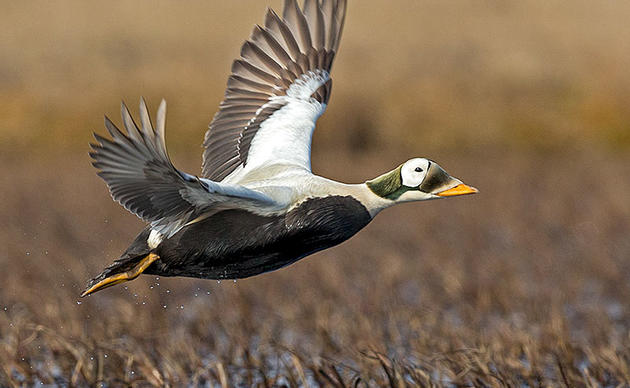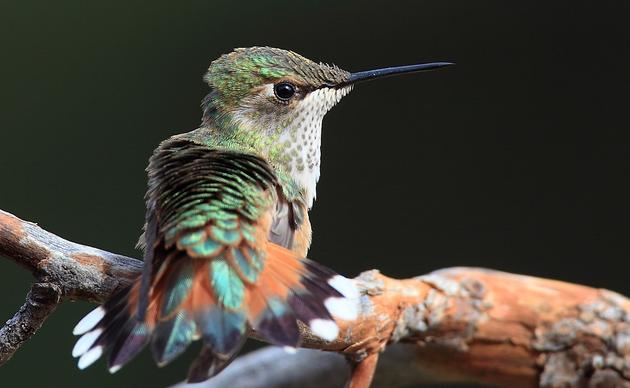Normal 0 false false false EN-US X-NONE X-NONE /* Style Definitions */ table.MsoNormalTable {mso-style-name:"Table Normal"; mso-tstyle-rowband-size:0; mso-tstyle-colband-size:0; mso-style-noshow:yes; mso-style-priority:99; mso-style-parent:""; mso-padding-alt:0in 5.4pt 0in 5.4pt; mso-para-margin-top:0in; mso-para-margin-right:0in; mso-para-margin-bottom:10.0pt; mso-para-margin-left:0in; line-height:115%; mso-pagination:widow-orphan; font-size:11.0pt; font-family:"Calibri","sans-serif"; mso-ascii-font-family:Calibri; mso-ascii-theme-font:minor-latin; mso-hansi-font-family:Calibri; mso-hansi-theme-font:minor-latin;}
An alliance of environmental and Alaska-based community groups are challenging the Bureau of Ocean Energy Management’s approval of Shell’s oil exploration plan for drilling this summer in the Chukchi Sea.
Earthjustice filed a lawsuit today in the Ninth Circuit Court of Appeals on behalf of Alaska Wilderness League, Center for Biological Diversity, Friends of the Earth, National Audubon Society, Natural Resources Defense Council, Northern Alaska Environmental Center, Pacific Environment, Resisting Environmental Destruction on Indigenous Lands (REDOIL), Sierra Club, and The Wilderness Society to challenge approval of Shell’s exploration plan. The Bureau of Ocean Energy Management greenlighted Shell’s plan in May, paving the way for the oil giant to drill in the Arctic Ocean’s Chukchi Sea starting as soon as July.
The Bureau of Ocean Energy Management conducted a rushed and cursory review of Shell’s plan that inadequately assessed its threats and effects. Shell’s approved exploration plan is even bigger, dirtier, and louder than 2012, including the use of two drilling rigs in a concentrated area and a bigger armada of vessels, all posing a threat to whales, walruses and seals, as well as air and water pollution discharges. Drilling in the Arctic is already a high risk proposition with a high potential for a disastrous oil spill in icy, harsh and remote conditions, which all agree couldn’t be cleaned up.
In recent days, the National Transportation Safety Board blamed Shell for the 2012 grounding and subsequent wreck of its Arctic drilling rig, the Kulluk. The NTSB found that Shell’s “inadequate assessment of the risk” of towing the rig across the Gulf of Alaska caused the accident. Shell simply wasn’t prepared. Shell proved again that we cannot trust the company when its 2015 rig, the Polar Pioneer failed a basic Coast Guard inspection this month and the Discoverer drillship was held in port due to pollution control failures.
Quotes from Groups:
“The Obama Administration has spent the last year in an embarrassing, blinkered rush to rubberstamp Shell’s 2015 Arctic Ocean drilling efforts for 2015, ignoring Shell’s disastrous 2012 drilling season and prioritizing corporate profits over the people and wildlife of America’s Arctic,” said Audubon Alaska Policy Director Jim Adams.
“Interior unlawfully approved Shell’s problem-riddled Arctic drilling plan. In doing this, it has failed the communities and wildlife of this region,” said Erik Grafe, Earthjustice staff attorney. “Allowing oil drilling in the Arctic Ocean takes us in the wrong direction on combating climate change and downplays the catastrophic consequences of an oil spill here. Shell proved itself unprepared in 2012, and it remains so today and should not be permitted to drill in our fragile Arctic Ocean.”
“We shouldn’t forget that Shell’s reckless and risky push to drill in the Arctic Ocean in 2012 ended with its drilling rig grounded off the coast of Sitkalidak Island, AK. Yet, recently, the Interior Department greenlighted a riskier and dirtier version of Shell’s exploration plan for 2015, which will devastate some of our most iconic wildlife – like walrus, polar bears and whales. It is irresponsible and reckless to allow any oil company to drill in our special places and America’s Arctic Ocean is one of them,” said Cindy Shogan, Executive Director, Alaska Wilderness League.
“In 2012 Shell went to the Arctic with two drill ships and came home with one. Despite Shell’s royal screw-ups in 2012, this year Interior has approved an even bigger, dirtier drilling plan. I shudder to think what will have to go wrong before our government gets the message that Arctic drilling is too risky,” said Rebecca Noblin, Alaska Director at Center for Biological Diversity.
“This is the largest, loudest, and dirtiest exploration plan ever proposed in the American Arctic Ocean,” said Friends of the Earth Climate Campaigner Marissa Knodel. “Shell’s revised Exploration Plan sets us on the path toward climate catastrophe as the latest science says Arctic oil must be kept in the ground in order to have a chance at keeping the planet safe. The only place for these dirty fossil fuels is in the ground.”
“There’s no worse place on earth to drill for oil than the Arctic Ocean, and no company with a worse recording trying than Shell,” said NRDC’s Arctic Director Nathaniel Lawrence. “And as reckless as it is to drill there, it could do even more harm by pumping all that carbon into the atmosphere, since science tells us Arctic oil has no place in a world grappling with the challenge of climate change.”
“Without regard to their stakeholders, the environmental and science communities, and most importantly the Arctic Nations that depend on this area, Shell is moving without caution to develop in the hostile Chukchi Sea,” said Jessica Girard, Arctic Program Manager of Northern Alaska Environmental Center. “This environmental injustice derives from federal allowance of extreme extraction projects which divert the U.S. from our climate change goals, disrupting a remotely pristine ecosystem and culture, all while continuing our dependence of fossil fuels. The time to end this dependence is now.”
"Shell Oil’s planned exploration of the Chukchi Sea poses heavy burden and risk on Inupiat cultural livelihood,” said Faith Gemmill, Executive Director of Resisting Environmental Destruction on Indigenous Lands (REDOIL). “Moving forward with drilling in the Chukchi Sea without any concrete measures to address a large oil spill in broken ice conditions is a perilous venture that could have disastrous consequences for the Inupiat and their whaling way of life. No amount of profit is worth the potential loss of a culture’s livelihood. REDOIL is standing in solidarity with Inupiat that want to protect their ancestral subsistence way of life. We believe that Shell Oil is making a mistake in the Arctic.”
"Both science and common sense is crystal clear in telling us that undeveloped dirty fuels, especially those in the Arctic, must remain in the ground if we are to avoid the worst consequences of climate disruption,” said Dan Ritzman, Alaska Program Director for Sierra Club's Our Wild America campaign. “Downplaying the threats drilling poses to our climate, communities, and environment —as Shell continues to do — does not in reality make the threats any less serious. The Obama administration must say no to drilling in the Arctic Ocean, cancel these leases, and remove future leasing from the five-year offshore drilling plan."



